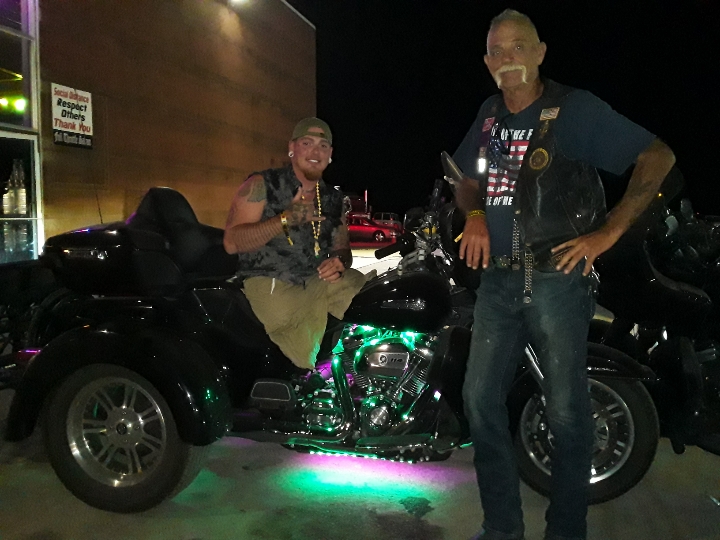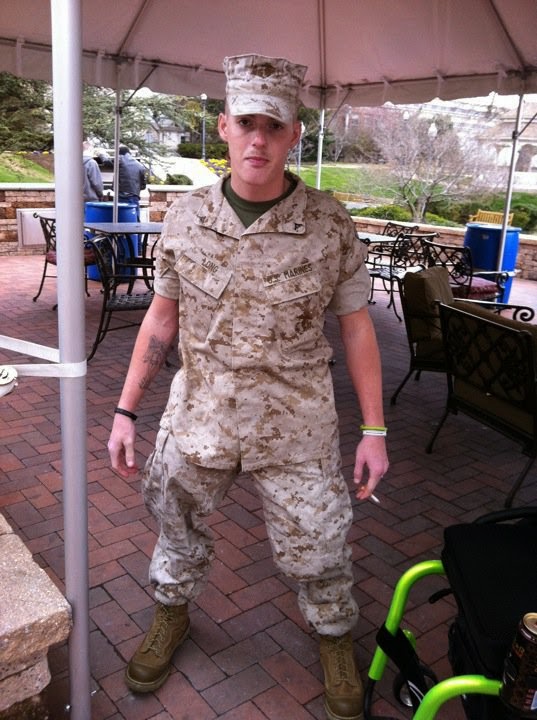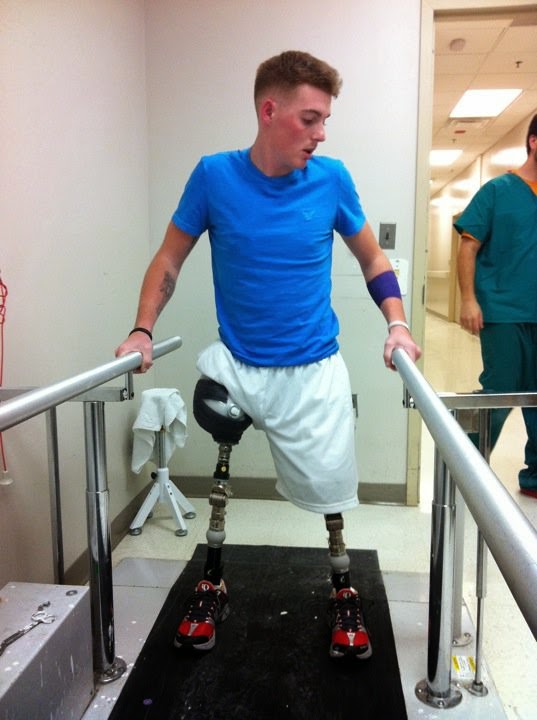Riding motorcycles is a hobby to many, a calling to others. For Brandon Long, it’s a necessity. Bitten by the bug after riding friend’s dirt bikes as a kid, his first street bike came at age 26, as a present to himself after a divorce. Like many U.S. Marines, he was planning what bike to get once he returned from a deployment to Afghanistan when an explosion changed everything. But even in the early stages of his recovery, Brandon was thinking to himself, “how am I going to ride again?” It took years, but there’s no point in fighting to recover from a near-death experience if you don’t plan on living… really living.
That’s why this year Brandon pointed his customized 2019 Harley Tri Glide away from his home in Florida and toward Sturgis, for the 80th anniversary of the biggest biker rally on Earth. That’s where some of the Russ Brown crew ran into him, repeatedly, because Brandon made sure he got around, seeing as much as any rally-goer can see at an event so huge. With such a unique story, it was just a matter of time before we could both get decompressed after the rally and sit down for a chat. We wanted to know why motorcycles are so integral to Brandon’s life and what kind of effort he had to put into getting back behind a set of handlebars.
RBMA: “So how did you first get into motorcycling?”
BL: “I’ve been interested in motorcycles my whole life. Most of my family had motorcycles while I was growing up and I got to go on my first ride when I was around 11. After that, I had a
buddy that let me ride his bike while I was in high school. Never got a bike of my own until I was 26. People had said I couldn’t ride and that it was too dangerous for me but I did it anyway. It was my gift to myself after my divorce.”
RBMA: “What first drew you toward military service, and why the Marines?”
BL: “Since I was about 4 years old, I’ve wanted to be in the military. I was at a parade once when the military members came by. I told my mom I wanted to be a soldier in the Army until I saw the Marines. Then I told her ‘I have to be one!!’ The overall discipline and courage of a Marine had me hooked from a very young age. I did everything I could in my life to make sure I could be a Marine. I got into trouble in high school that almost made it so I couldn’t join, and I was devastated. But luckily with hard work and determination, I became a Marine as I had always dreamed. “
RBMA: “When did you serve, and what job did you have?”
BL: “I was 0311, infantry. I joined in February of 2009 and was injured in December 2010. I separated from the Marine Corps in September of 2012.
RBMA: “Were you planning to make a career out of it before being wounded?”
BL: “I did want to make a career out of the military. I was wanting to do eight years in the infantry then switch to the Navy to learn medicine and medical practices”
RBMA: “Things changed drastically after being wounded obviously: how and when did it happen?”
BL: “I was wounded on December 21, 2010, in Sangin, Helmand Province, Afghanistan. I was leading a foot patrol out by the Helmand River when we saw hundreds of stacked rocks on the sides of the road. It was my job to try and find a wire of some sort, or even the explosive itself so we could call EOD [Explosive Ordinance Disposal] to destroy it. In the process of looking for indicators, I stepped over a bush to get a better look at a cluster of rocks. In doing so, I stepped on an IED [Improvised Explosive Device]. When it went off, I immediately lost my left leg at the knee, and my right leg was mangled almost all the way to my hip. I also took a rock through my right leg and into my intestines from that blast. I was conscious almost the whole time until the helicopter arrived on the scene. If it wasn’t for the bravery my Corpsman [combat medics for the Marines are called Corpsmen, attached from the Navy] and fellow Marines showed, I would not be here today.”
RBMA: “Damn. So obviously it takes years to adjust to that kind of change. So I’m imagining the focus being in recovery and physical therapy, so how long was it before you started thinking about riding motorcycles again? What problems did you need to solve to get back into riding?”
BL: “After I was injured, one of the first questions I asked immediately after the explosion as if I was going to be able to ride again. I had planned on buying a bike when I got back from that deployment. As I did my recovery, I looked everywhere for ways to be able to ride. It wasn’t until about six years after my injury that I was able to make that happen thanks to the help of the Harley Davidson staff in Jacksonville, Florida.”
RBMA: “What made riding motorcycles worth the effort? Why do you still ride?”
BL: “The freedoms that come with a motorcycle were definitely worth all the effort it took to ride [again]. Wind therapy helps me out a lot on days where I am in my head a lot. I still ride because that’s one thing that lets me feel normal in a sense. I plan on riding as long as I am breathing.”
RBMA: “Yeah, I totally get it. You can just be you. So what kind of trips do you normally do? Do you use the bike around town or just long trips?”
BL: “Sturgis [2020] was my first real trip with the bike. Normally I’ll get on it and just ride for an hour or so and find somewhere to eat, then come back home. But at Sturgis, I was able to build a lot more confidence in my riding abilities. I put almost 2,000 miles on my bike in just a few days and I rode a lot tougher roads than anything Florida has. I would love to do a trip across the country at some point, but that’s something I’m gonna have to really plan for.”
RBMA: “Right on. So tell me about your first trike. What was it, and you said something about an accident? What happened? How did you come about getting your current Tri-Glide and why did you want to continue riding after the wreck?”
BL: “My first trike was a 2017 Harley-Davidson Freewheeler. It was a beautiful orange with a bunch of chrome. That was the first bike I’d ever owned as well. I had it for about two years when I had to make a split-second right turn to avoid colliding with a car and the sudden movement caused me to fall off the bike as the bike went off into the woods.”
RBMA: “Holly #@!*…”
BL: “The insurance company decided to total the bike. I was devastated. But I told myself that I couldn’t let that stop me from riding again. So my daughter and I went back to Harley and I told her to help me pick out the next bike. She instantly ran over to a black Tri-Glide and got on. She told me I should buy that bike because she really liked it. A couple of hours later, it was mine! We had to take off some of the modifications from my old bike and put them on the new one. Luckily the crew there knew what they were doing and got it swapped out for me in only a couple of days. I was back riding before the scabs healed [laughs].”
RBMA: “[Laughs]. So yeah, tell me a bit about the Tri-Glide build. What mods did you do to make it work for you?”
BL: “The Tri-Glide build was pretty easy since we had done that already on the Freewheeler, but figuring everything out for that bike was a pain. I had a great friend of mine who sold me the bike, looking with me for parts to make it shift with my thumb and have two brake levers. It took a couple of weeks of searching until we found things that worked. I don’t remember the first shifter I had but I replaced it with a Pingel shifter after about a year or so. But the initial install took a couple of weeks because the crew at [the] Harley [dealer] had never modified a bike before. I am thankful that they went out of their way to learn for me. After I had the accident on the first bike, I chose the Tri-Glide because I wanted a GPS and radio. My daughter picked the actual bike and I’m enjoying it very much.”
RBMA: “What are you up to when you aren’t riding? Work, hobbies, school, clubs, volunteering?”
BL: “When I’m not riding my bike, I’m usually in the woods with my Jeep. Anytime I can be in the woods, I’m quick to do so. Something about the woods and nature brings me peace. I enjoy hunting and fishing too. Really, anything that can get me outside, I enjoy. I just started a new job doing silt fencing at construction sites so I am excited to see where this takes me.”
RBMA: “Who do you normally ride with, or do you ride solo?”
BL: “When I ride, I’m mostly solo but I do have a few friends I’ll try to ride with. I‘m a new member of the CVMA [Combat Veterans Motorcycle Association] and I’m looking forward to riding with them in the future.”
RBMA: “What’s the future look like? New trips planned? New bike builds? New projects outside the motorcycle scene?”
BL: “For me, the future is looking pretty bright. I’m trying to plan for Sturgis next year and try to make that a yearly thing. I’m planning on doing a bit more traveling soon. I’d love to go visit another country sometime soon, too. [I am also] thinking about getting another bike, but without all the bells and whistles… but we will see.”
So there you have it. You can’t keep a good man down, and Brandon’s story is proof of that. It’s already a fight just to survive serious wounds, and another fight to adapt your body and mind to cope with new limitations. But our limitations aren’t what defines us; it’s what we do in the face of them that defines us. Brandon Long is a reminder to us all that if you have the right perspective and you pursue the things you want in life, things may slow you down from time to time, but nothing can stop you.
By: Johnny Killmore
Photos: Courtesy of Brandon Long









